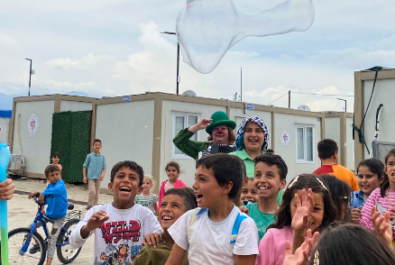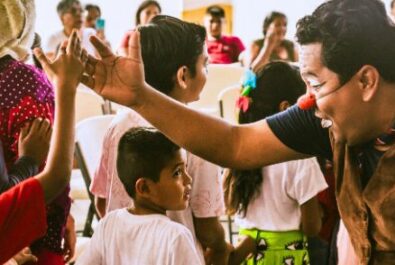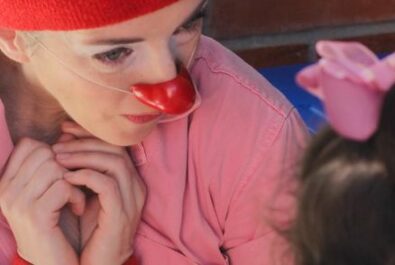Gear up for good! Shop our new collection of CWB apparel.
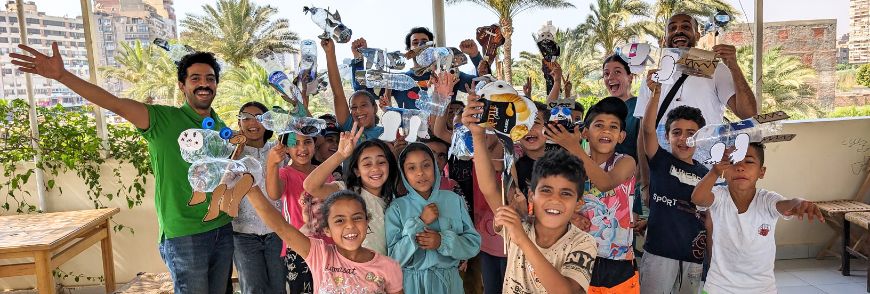
Laughter as a Bridge: Building Connections While Cleaning Up the Nile
Laughter. It’s a universal language, a bridge that transcends borders and cultures.
Clowns Without Borders (CWB) harnesses the power of humor to bring people together, especially in challenging environments.
Our recent tour in Egypt exemplifies this mission perfectly and demonstrates how laughter can be a catalyst for both social cohesion and environmental awareness.
The journey began with a collaboration between CWB Artist in Residence Hannah Gaff and a talented Egyptian team, including Nelly Abd-El Maksoud, Saly Ahmed, Sami Gomaa, Tarek Ahmed, and Diaa Eldin Rayad, under the guidance of Project Manager Ahmed Moussa.
Then the Garbage Monster showed up…
Project Summary: A Creative Collaboration

CWB-USA partnered with Vassar College and Dawar Arts Egypt for the groundbreaking Theatre for Climate Justice Project to address the intersecting crises of climate change and forced displacement in Egypt.
By leveraging the power of theatre and puppetry, the team aimed to support the work of vulnerable communities, particularly refugees and asylum seekers, while addressing environmental concerns.
Through interactive workshops and captivating performances, the team explored the challenges posed by climate change, including sea-level rise, pollution, and resource scarcity. These issues disproportionately affect forcibly displaced populations who often live in overcrowded and precarious conditions.
The Andrew W. Mellon Foundation generously supported the project through the Consortium on Forced Migration, Displacement, and Education (CFMDE).
Now let’s explore how play and laughter are potent tools for building community, fostering creativity, and addressing pressing global challenges.
Forcibly Displaced Communities, Egypt
According to the UNHCR, Egypt hosts around 670,000 registered refugees and asylum-seekers from 62 nationalities, including Syria, Sudan, South Sudan, Eritrea, Ethiopia, Yemen, Somalia, and Iraq.
Many refugees in Cairo don’t qualify as refugees and don’t have UNHCR protection. They suffer high unemployment rates (not legally allowed to work), visa, reciprocity, license issues, rights violations, language barriers, and discrimination.
Defeating the Garbage Monster
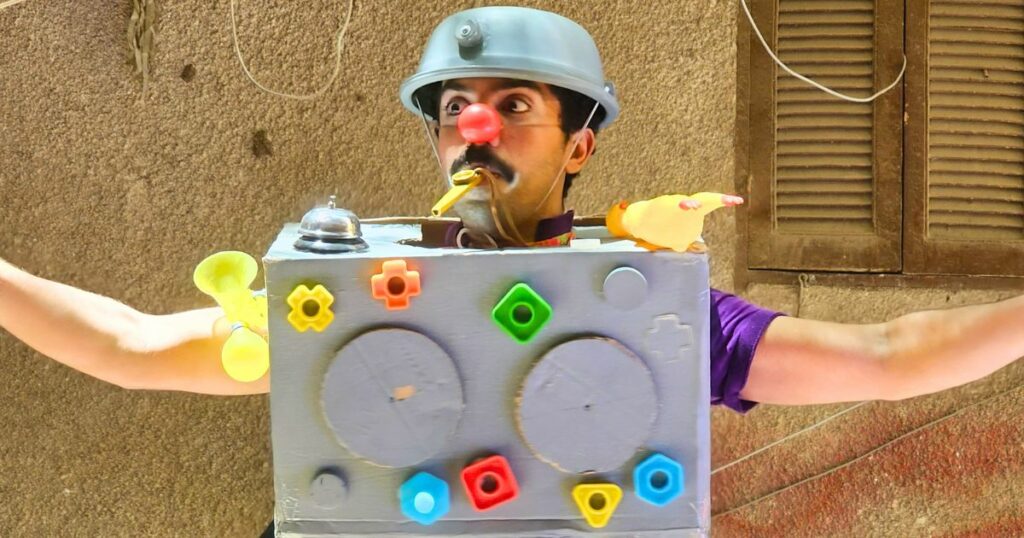
The team developed a captivating one-hour play centered on the pressing issue of pollution in the Nile River.
A central character in the play was the formidable “Garbage Monster,” a symbol of the environmental challenges facing Cairo.
Kids with refugee or asylum seeker status from Sudan, South Sudan, Syria, Somalia, Ethiopia, Eritrea, and Yemen helped defeat the play’s Garbage Monster that was destroying their villages.
“Many brave kids would raise their hands and say the most beautiful ideas for reducing plastic waste, containing garbage, reducing pollution and then one would suggest that we clean up all the pollution in the river right in front of us.”
– Hannah Gaff
Artist Diaa Eldin Rayad shared that, “Interacting with children is one of the most enjoyable moments for me. One child told me,
‘I am not a garbage monster!’”
When we came to the end of the show, he collected the plastic bottles by himself without being asked to do so.
By engaging children, particularly those with refugee or asylum-seeker backgrounds, in confronting this monstrous foe, the team encouraged a sense of agency and empowerment.
And when you defeat the Garbage Monster, you, of course, need a dance party to celebrate your victory…
He Found His Voice Through Play
Workshops hosted by the team lead children to transform everyday trash into vibrant puppets of fish, crocodiles, and cobras.
The act of upcycling empowered children to become active participants in environmental conservation. This creative approach sparked imagination and ignited a sense of responsibility for action.
One particularly heartwarming story emerged from the workshops.
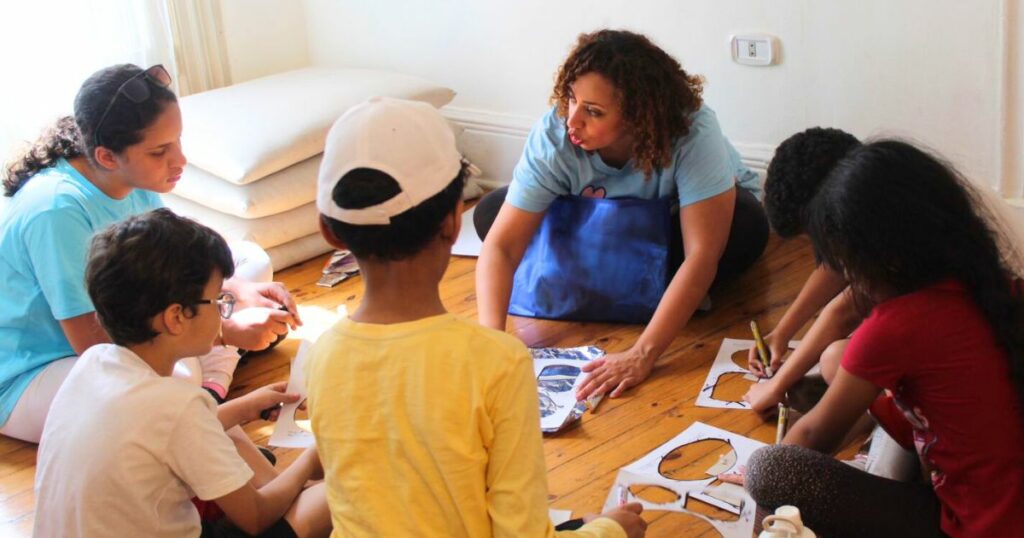
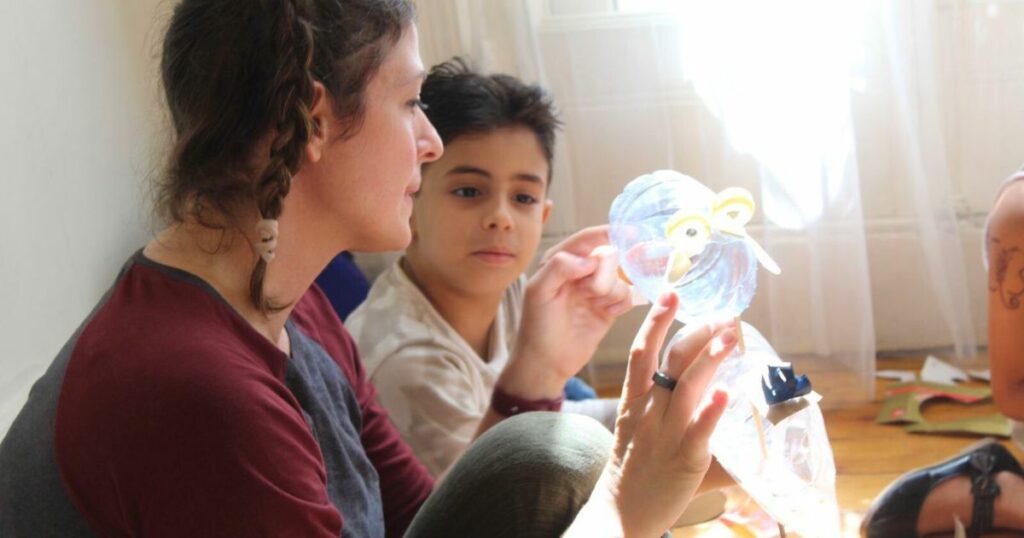
A quiet six-year-old boy asked Sami Gomaa to name his fish puppet “pet.” This request surprised his mother, who told us her boy is, “silent all the time.”
Children’s voices, too frequently silenced by adversity, found expression through play and creativity through the Theatre for Climate Justice Project.
Tarek Ahmed recalls another moment when a child practiced agency and self-expression:
“A girl decided to make the tail in her own way. After suggestions from me about how to make the tail, she told me, ‘Hmmmm…, I will draw it.’”
Nelly Abd-El Maksoud shared how a child’s passionate creativity inspired her own creativity:
“Today there was a little girl who made the crocodile puppet. And for the first time, I experienced the feeling that someone was fully aware that she was doing something beautiful. This is a new feeling for me. She kept putting in a lot of details of her own, and I kept cutting her pieces and doing anything she wanted. She was very passionate about the puppet and had a great interest in it. She made me feel it was possible to turn the simplest things into beautiful things.”
These events highlight the transformative power of play in unlocking children’s potential and fostering self-expression.
Laughter Unleashed in Egypt

Hannah Gaff, our artist-in-residence, observed firsthand the transformative power of play. She recalls,
“In the beginning of the workshop, two kids said they didn’t think they could make the puppets (made of plastic and garbage found on the street) and by the end they were so proud of the puppets they made, showing them off to everyone.”
And,
“After the kids made the puppets, they wanted to take them outside to play in the playground. They ran around the building with them, bringing them to life.”
A newfound confidence was palpable as they brought their puppets to life, imaginations soaring.
Diaa Eldin Rayad, a member of the Egyptian team, also witnessed the magic of play unfold. He shared, “The children played with us while laughing. A 6-year-old-boy of Sudanese nationality told me,
‘We will make a snake from a bag of chips. This is difficult!’”
Beyond the technical skill of puppet making, the children demonstrated a remarkable capacity for problem-solving and adaptation.
The workshop became a safe space where they could express themselves freely, build friendships, and develop a deeper understanding of one another.
By providing opportunities for imaginative play and collaborative creation, the team empowered children to overcome challenges, build resilience, and envision a brighter future.
Conclusion
The project brought together children from diverse backgrounds, such as Sudan and Eritrea, fostering a sense of belonging and understanding.
The shared experience of creating, performing, and laughing helped bridge cultural divides and build a stronger community.
Dear Reader,
As you’ve just read, laughter is a powerful tool that can bridge divides, spark creativity, and inspire hope. Our work at Clowns Without Borders is made possible thanks to generous supporters like you.
Your donation ensures that we can continue to bring joy and laughter to children facing crisis. With your support, we can expand our reach and impact even more communities around the world.
Please consider making a gift today to help us spread laughter and change lives. Every donation, no matter the size, makes a difference.
Thank you for your support!

